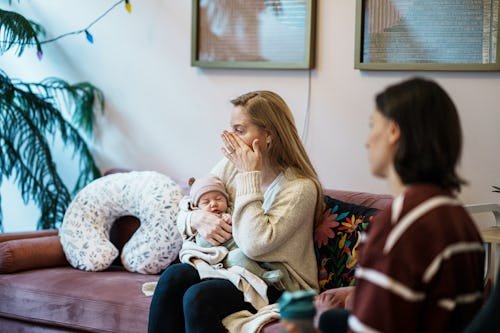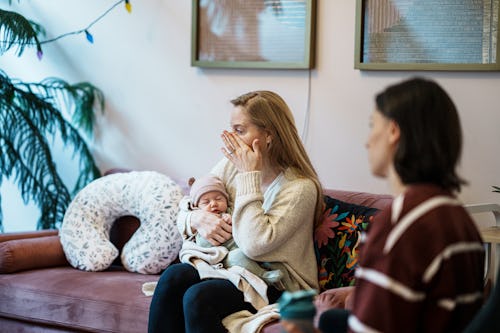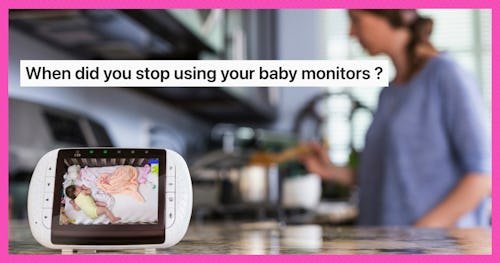

Every local mom Facebook group, every Reddit thread on motherhood, every conversation with a group of women talking about raising kids eventually leads to the same topic — and no, it’s not sleep training. It turns out that when you have a child, you then spend a lot of time with that child’s other parent, and the trials and triumphs of that partnership (whether it’s a marriage or not) can blur into all of your ups and downs of parenting.
In a recent Reddit thread on the subreddit/mommit, one user shared that she was looking for a “new support group” for motherhood after the one she went to quickly became a “marriage support group” instead. The user wrote, “It turns out that the number one difficulty of motherhood for this group of women is their husbands. The group sessions turned into relationship counseling as the women shared the selfish behaviors of their husbands. The word ‘divorce’ began to be used. Mothers crying because they feel like single moms. Parenting was rarely discussed.”
Phew.
Also… this happens in every motherhood support group.
But why?
The Reddit user shared she had to leave the group because she has a “great husband,” but I’d argue that even those with husbands who pull their weight could still benefit from a little rant every now and then about their marriage.
And experts agree.
“When couples become parents, a lot changes both in their own lives and as a family. Before kids, their primary focus is usually each other; afterward, a new baby quickly becomes the center of their world. This transition can be beautiful and deeply meaningful, but it can also be disorienting,” says licensed marriage and family therapist Saba Harouni Lurie. “Parents may both feel devoted to their child yet miss the closeness they once had with each other.”
None of that means your marriage is in trouble, but it does make sense as to why a motherhood support group can quickly become a marriage support group.
Jennifer B., a mom of three in South Carolina, tells me that she relates deeply to the Reddit user who shared that rarely was anybody discussing parenting in her own mom group — but it was more healing than anything else for her. “Of course we were all struggling with sleep issues with our babies, but as we’re all talking about it, we realized what we were actually saying was, ‘We need more help.’ It wasn’t just that our kids woke us up at night; it was that nobody stepped in — and by nobody, I mean our husbands — to make sure we were getting rest when we could. After one afternoon where a few of us were in tears over our exhaustion, another mom said, ‘Do your husbands know how much you’re up with the baby?’ It was like a light bulb went off.”
Then there is the topic of intimacy. From postpartum sex to finding time to reconnect with their partner, Jennifer says everyone’s relationships became a topic of conversation. “We all talked a lot about how we didn’t feel like ourselves, and of course, that’s going to affect our marriages. It was just so much more than ‘oh wow, motherhood is tough’ and more like ‘motherhood is making me feel like an alien and I don’t know how to deal with it.’”
While asking parenting questions and discussing motherhood and the act of raising kids is obviously a huge part of a motherhood support group, the fact is that motherhood isn’t just choosing the right bottle or when to stop swaddling or how to deal with threenager tantrums. It’s all encompassing, and as you grow in motherhood and have more experiences with your children, it can feel like the “old you” is farther away than you thought. It’s not always a bad thing; it’s just new. But new things can affect your marriage, too.
“The ways you used to connect, like spending uninterrupted time together, long conversations, shared activities, are often replaced by exhaustion, logistical talk, and competing demands,” Lurie says. “It’s easy for partners to feel lonely in parallel, even while sharing the same space. The mental load, overstimulation, and imbalance that many parents describe can strain a relationship and create resentment if not addressed.”
Sarah T., a mom of one in New York, tells me she found great comfort in a Facebook group for moms in her area. “But I’d say that the ‘support’ was always less about parenting and more about just supporting our new lives.”
Adding in all the ways parenting affects your relationship and all of the ways motherhood changes you, it’s bound to happen that your “motherhood support group” has a whole lot of marriage talk.
But the two don’t have to be mutually exclusive. Motherhood isn’t just some new label you slap onto your life — it changes everything. And you really can’t put a spotlight on any part of parenting or being a mother without illuminating everything around it, like your marriage.
“We spend a lot of time in our group helping each other in our marriages,” Sarah says. “But that doesn’t make it less of a mom support group. We’re moms, right? We’re supporting each other through everything, whether that’s a baby who doesn’t sleep or a husband who doesn’t help.”
Jennifer agrees and tells me that she’s never felt like her mom support group shouldn’t also be a discussion about marriage. “It all just blends together,” she says. With experts like Lurie agreeing that parenthood can affect even the most rock-solid marriages and partnerships, it shouldn’t be a surprise to hear a mom give a little vent about her husband who accidentally woke the baby after she’d just got them to sleep or even an anxious mom feel resentful that she has to work instead of staying home with her baby because her partner doesn’t make enough on one income.
If your motherhood support group isn’t giving you what you need, it’s fine to leave it. But if you’re expecting every motherhood support group to just be a one-track hive mind of baby monitor recommendations and discussions about private school versus public school, it might be time to remember that motherhood is bigger than we think — and it can affect everything.


